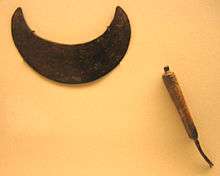Nail clipper

A nail clipper (also called a nail trimmer or nail cutter) is a hand tool used to trim fingernails, toenails and hangnails.
Design
Levers of a compound-lever clipper. Purple triangles denote the fulcrums.
Nail clippers are usually made of stainless steel but can also be made of plastic and aluminium. Two common varieties are the plier type and the compound lever type. Most nail clippers usually come with another tool attached, which is used to clean dirt out from under nails. A nail clipper often has a miniature file fixed to it to allow rough edges of nails to be manicured. A nail file allows for removal of any excess nail that is jagged or has been missed. Nail clippers occasionally come with a pocket knife or a nail catcher. The nail clipper consists of a head which may be concave or convex. Specialized nail clippers which have convex clipping ends are intended for trimming toenails, while concave clipping ends are for fingernails. The cutting head may be manufactured to be parallel or perpendicular to the principal axis of the cutter. Cutting heads which are parallel to the principal axis are made to address accessibility issues involved with cutting toenails.
History


The inventor of the nail clipper is not exactly known, but the first United States patent for an improvement in a finger-nail clipper (implying such a device already existed) seems to be in 1875 by Valentine Fogerty.[1] Other patents for an improvement in finger-nail clippers are in 1876, William C. Edge,[2] and in 1878, John H. Hollman.[3] Filings for complete finger-nail clippers (not merely improvements) include, in 1881, Eugene Heim and Celestin Matz,[4] in 1885, George H. Coates (for a finger-nail cutter),[5] and, in 1905, Chapel S. Carter (son of a Connecticut Baptist church deacon)[6] patented a finger-nail clipper[7][8][9] with a later patent in 1922.[10] Around 1913, Carter was secretary of the H. C. Cook Company of Ansonia, Connecticut,[11] which was incorporated in 1903 as the H. C. Cook Machine Company by Henry C. Cook, Lewis I. Cook, and Chapel S. Carter.[12] Around 1928, Carter was president of the company when, he claimed, about 1896, the "Gem"-brand finger nail clipper made its first appearance.[13]
Around 1906, the L. T. Snow company[14] manufactured nail cutters.[15] Around 1908[16] (or 1911), the King Klip Company of New York manufactured nail cutters.[17][18]
In 1947, William E. Bassett (who started the W. E. Bassett Company in 1939) developed the "Trim"-brand nail clipper,[19] the first made using modern (at the time) manufacturing methods[20] using the superior jaw-style design that had been around since the 19th century, but adding two nibs near the base of the file to prevent lateral movement, replacing the pinned rivet with a notched rivet, and adding a thumb-swerve in the lever.[19]
See also
References
- ↑ US 161112, Fogerty, Valentine, "Improvement in finger-nail trimmers", issued February 24, 1875
- ↑ US 183256, Edge, William C., "Improvement in finger-nail trimmers", issued October 17, 1876
- ↑ US 205088, Hollman, John H., "Improvement in finger-nail trimmers", issued April 17, 1878
- ↑ US 244891, Heim, Eugene & Matz, Celestin, "Finger-nail trimmer", issued July 26, 1881
- ↑ US 342780, Coates, George H., "Finger-nail cutter", issued August 24, 1885
- ↑ "Deacon Selden Carter dies". The Day. May 25, 1916.
- ↑ A brief history of the nail clipper is printed in The Size of Thoughts: Essays & Other Lumber, Nicholson Baker, New York: Vintage 1997. ISBN 0-679-77624-9.
- ↑ US 797937, Carter, Chapel S., "Finger-nail trimmer", issued August, 1905
- ↑ US 797938, Carter, Chapel S., "Finger-nail trimmer", issued August 22, 1905
- ↑ US 1436010, Carter, Chapel S. & Carter, Hedley P., "Finger-nail trimmer", issued November 21, 1922
- ↑ An Export Shipping Tour of New York City, American Industries, Volume 14, Number 5, National Association of Manufacturers, December 1913, p. 43 (retrieved 30 August 2010 from Google Books)
- ↑ Notes, News and Personals, Modern Machinery, Volumes 13–14, May 1903, p. 167 (retrieved 30 August 2010 from Google Books)
- ↑ , The American Exporter, Volume 102, John C. Cochran Co., 1928, p.162 (retrieved 30 August 2010 from Google Books)
- ↑ In 1889, Levi T. Snow became proprietor of the Strong Fire Arms Company (founded 1884 and previously Strong Cartridge Company, founded 1881)—see Strong Fire Arms Company
- ↑ Beats Them All: The Snow Nail Clipper, advertisement in Hardware Dealers' Magazine, Volume 25, January 1906, p. 32 (retrieved 30 August 2010 from Google Books)
- ↑ Antique Nail Clippers ~ King Klip (retrieved 30 August 2010 on Millscentral.com)
- ↑ The Era Druggists' Directory, Volume 15, D. O. Haynes & Co., 1911 (retrieved 30 August 2010 from Google Books)
- ↑ 1910-20's "KING KLIP" Steel Nail Clipper (Japanese; retrieved 30 August 2010 from funny-supply.com)
- 1 2 Baker, Nicholson, "Clip Art", Annals of Technology, The New Yorker, November 7, 1994, pp. 165-67 (retrieved 30 August 2010)
- ↑ Giving Stories: The Bassett family has a history in the Valley, The Valley Community Foundation of Greater New Haven, Connecticut (retrieved 27 August 2010)
External links
| Wikimedia Commons has media related to Nail cutters. |
| Look up nail clipper in Wiktionary, the free dictionary. |
